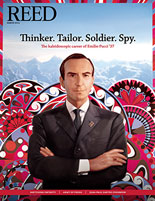
IRIS login | Reed College home Volume 93, No. 1: March 2014
Eliot Circular
Elvish, Batman, and Infinite Jest

In David Foster Wallace’s 1996 novel Infinite Jest, the students at Enfield Tennis Academy play a baroque Cold War simulation game called Eschaton, which calls for a game board of several tennis courts. Over Paideia, mathematics/physics major Andrew Warren’14 led a version of the game, Eschaton Lite, which merely requires a large field, pen-and-paper calculation, and sturdy jackets. Photo by Alex Krafcik ’15
Ever wanted to try Pysanky, the art of Ukrainian egg-dyeing? Take up fire dancing? Get up to speed on the history of Batman? These and more than 220 subjects were covered in this year’s Paideia, the festival of alternative learning that Reed holds each winter.
Paideia (Παιδεία) is difficult to translate, but denotes education in its broadest sense. For the ancient Greeks, this included philosophy, poetry, mathematics, physics, rhetoric, gymnastics, music, medicine, and many other disciplines. The animating idea behind Paideia is to give students a break from Reed’s rigorous curriculum and let them spend a week learning things they always wanted to know about but never had time for.
Paideia also reverses the polarity of the classroom and gives students the chance to be teachers, sharing their mastery of the didgeridoo, High Elvish, the programming language Python, or virtually any other subject.
First held in 1969, Paideia became a hot topic among alumni last year after President John Kroger questioned the propriety of a couple of classes on drugs and alcohol. Following extensive campus discussion, a faculty-student committee figured out a way to reinvigorate the festival.
The result? More classes than ever. Nor has the festival lost its edge, demonstrated in classes on the science of drugs (taught by a psychology professor), the econo-imics of stripping, and Demonology 112. In fact, President Kroger got in on the act himself, teaching classes on Heidegger, law school, and “Mafia Hitmen I Have Known.”

LATEST COMMENTS
steve-jobs-1976 I knew Steve Jobs when he was on the second floor of Quincy. (Fall...
Utnapishtim - 2 weeks ago
Prof. Mason Drukman [political science 1964–70] This is gold, pure gold. God bless, Prof. Drukman.
puredog - 1 month ago
virginia-davis-1965 Such a good friend & compatriot in the day of Satyricon...
czarchasm - 4 months ago
John Peara Baba 1990 John died of a broken heart from losing his mom and then his...
kodachrome - 7 months ago
Carol Sawyer 1962 Who wrote this obit? I'm writing something about Carol Sawyer...
MsLaurie Pepper - 8 months ago
William W. Wissman MAT 1969 ...and THREE sisters. Sabra, the oldest, Mary, the middle, and...
riclf - 10 months ago